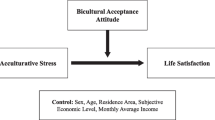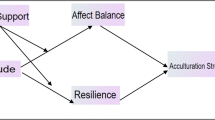Abstract
Acculturative stress and bicultural acceptance attitudes are important predictors of adaptation and success in multicultural adolescents, and the two variables seem closely related. Furthermore, clarifying the causal relationship between the two variables may be important in the development of strategies to facilitate their adaptation to South Korean society. we used an autoregressive cross-lagged model to examine the causal relationship between Acculturative stress and bicultural acceptance attitudes based on the data of 1635 adolescents from the Multicultural Adolescents Panel Study. Autoregressive analysis indicated that acculturative stress and bicultural acceptance attitudes remained stable over time. Cross-lagged analysis showed that bicultural acceptance attitude negatively affected acculturative stress, while acculturative stress had no significant effect on bicultural acceptance attitudes. Bicultural acceptance attitudes decrease acculturative stress. Thus, in order to reduce the acculturative stress experienced by multicultural adolescents during acculturation and to prevent psychological and emotional problems, personal and social efforts are needed to increase bicultural acceptance attitudes.

Similar content being viewed by others
Data Availability
The analysed datasets are available in the National Youth Policy Institute repository, https://www.nypi.re.kr/contents/site.do;jsessionid=36FC1F17C51BB5AE39FB64CCE0683D0E
References
Bae, S. M. (2020). The relationship between bicultural identity, acculturative stress, and psychological well-being in multicultural adolescents: Verification using multivariate latent growth modelling. Stress and Health, 36(1), 51–58.
Baysu, G., & Phalet, K. (2019). The up-and downside of dual identity: Stereotype threat and minority performance. Journal of Social Issues, 75(2), 568–591.
Berry, J. W. (1997). Immigration, acculturation, and adaptation. Applied Psychology, 46(1), 5–34.
Berry, J. W. (2007). Acculturation strategies and adaptation. In J. E. Lansford, K. Deater-Deckard, & M. H. Bornstein (Eds.), Duke series in child development and public policy. Immigrant families in contemporary society (pp. 69–82). Guilford Press.
Berry, J. W., & Annis, R. C. (1974). Acculturative stress: The role of ecology, culture and differentiation. Journal of Cross-Cultural Psychology, 5(4), 382–406.
Berry, J. W., & Sabatier, C. (2011). Variations in the assessment of acculturation attitudes: Their relationships with psychological wellbeing. International Journal of Intercultural Relations, 35(5), 658–669.
Berry, J. W., Poortinga, Y. H., Pandey, J., Segall, M. H., & Kâğıtçıbaşı, Ç. (1997). Handbook of cross-cultural psychology: Theory and method (Vol. 1). John Berry.
Berry, J. W., Phinney, J. S., Sam, L. D., & Vedder, P. (2006). Immigrant youth: Acculturation, identity and adaptation. Applied Psychology: An international Review, 55(3), 303–332.
Biswas, D. (2019). Identity development, acculturation among Bowbazar Chinese community. Asian Ethnicity, 20(2), 250–261.
Bollen, K. A., & Curran, P. J. (2004). Autoregressive latent trajectory (ALT) models a synthesis of two traditions. Sociological Methods & Research, 32(3), 336–383.
Brown, M. W., & Cudeck, R. (1993). Alternative ways of assessing model fit. Testing structural equation models, 154, 136–162.
Cheung, G. W., & Rensvold, R. B. (2002). Evaluating goodness-of-fit indexes for testing measurement invariance. Structural Equation Modeling, 9(2), 233–255.
Erikson, E. H. (1993). Childhood and society. WW Norton & Company.
Eun, S. M., Lee, S. H., & Lee, K. Y. (2019). Acculturative stress amongst multicultural adolescents: Patterns, predictors, and psychosocial outcomes. Studies on Korean Youth, 30(2), 177–211.
Folkman, S., & Lazarus, R. S. (1984). Stress, appraisal, and coping (p. 460). Springer Publishing Company.
Galliher, R. V., Jones, M. D., & Dahl, A. (2011). Concurrent and longitudinal effects of ethnic identity and experiences of discrimination on psychosocial adjustment of Navajo adolescents. Developmental Psychology, 47(2), 509–526.
Gonzalez, N. (2018). Acculturation, Biculturalism, And Familistic Cultural Values' Relationship With Latino Mental Health. Open Access Theses & Dissertations. 1442. Available from https://scholarworks.utep.edu/open_etd/1442
Hall, S., & Du Gay, P. (Eds.). (1996). Questions of cultural identity. SAGE Publications
Hong, J. J. (2004). A Study on psychosocial adaptation of youth in mongolian migrant workers' family. Unpublished master's thesis, Ewha Womans University, Seoul.
Hovey, J. D., & King, C. A. (1996). Acculturative stress, depression, and suicidal ideation among immigrant and second-generation Latino adolescents. Journal of the American Academy of Child & Adolescent Psychiatry, 35(9), 1183–1192.
Katsiaficas, D., Suárez-Orozco, C., Sirin, S. R., & Gupta, T. (2013). Mediators of the relationship between acculturative stress and internalization symptoms for immigrant origin youth. Cultural Diversity and Ethnic Minority Psychology, 19(1), 27–37.
LaFromboise, T., Coleman, H. L., & Gerton, J. (1993). Psychological impact of biculturalism: Evidence and theory. Psychological Bulletin, 114(3), 395–412.
Lee, S. (2018). A study of longitudinal changes and relevant factors of muticultural acceptability attitudes amongst multiethnic adolescents. Studies on Korean Youth, 29(29), 179–208.
McCord, A. L., Draucker, C. B., & Bigatti, S. (2019). Cultural stressors and depressive symptoms in Latino/a adolescents: An integrative review. Journal of the American Psychiatric Nurses Association, 25(1), 49–65.
Mena, F. J., Padilla, A. M., & Maldonado, M. (1987). Acculturative stress and specific coping strategies among immigrant and later generation college students. Hispanic Journal of Behavioral Sciences, 9(2), 207–225.
Miller, M. J., Yang, M., Farrell, J. A., & Lin, L. L. (2011). Racial and cultural factors affecting the mental health of Asian Americans. American Journal of Orthopsychiatry, 81(4), 489–497.
Ministry of Education(2019). Announcement of the results of basic education statistics for 2019. 5–6.
Nho, C. R., & Hong, J. J. (2006). Adaptation of migrant workers' children to Korean society: Adaptation of Mongolian migrant worker's children in Seoul, Gyeonggi area. Journal of the Korean Society of Child Welfare, 22, 127–159.
Padilla, A. M. (2008). Social cognition, ethnic identity, and ethnic specific strategies for coping with threat due to prejudice and discrimination. In Motivational aspects of prejudice and racism (pp. 7–42). Springer
Romero, A., Piña-Watson, B., Stevens, A. K., Schwartz, S. J., Unger, J. B., Zamboanga, B. L., Szapocznik, J., Lorenzo-Blanco, E., Cano, M. Á., Meca, A., Baezconde-Garbanati, L., Córdova, D., Villamar, J. A., Soto, D. W., Lizzi, K. M., Des Rosiers, S. E., Pattarroyo, M., & Oshri, A. (2020). Disentangling relationships between bicultural stress and mental well-being among Latinx immigrant adolescents. Journal of Consulting and Clinical Psychology, 88(2), 149–159.
Sirin, S. R., Ryce, P., Gupta, T., & Rogers-Sirin, L. (2013). The role of acculturative stress on mental health symptoms for immigrant adolescents: A longitudinal investigation. Developmental Psychology, 49(4), 736–748.
Statistics Korea (2018). Population census for 2018. Korean Statistical Information Service, https://meta.narastat.kr/metasvc/index.do?confmNo=101001
Tartakovsky, E. (2007). A longitudinal study of acculturative stress and homesickness: High-school adolescents immigrating from Russia and Ukraine to Israel without parents. Social Psychiatry and Psychiatric Epidemiology, 42(6), 485–494.
Troesch, L. M., Segerer, R., Claus-Pröstler, N., & Grob, A. (2020). Parental acculturation attitudes: Direct and indirect impacts on Children’s second language acquisition. Early Education and Development, 1-19.
Waterman, A. S. (2015). The Oxford handbook of identity development. Identity as internal processes: How the “I” comes to define the “Me.”. (pp. 195–209).
Wei, M., Liao, K. Y. H., Chao, R. C. L., Mallinckrodt, B., Tsai, P. C., & Botello-Zamarron, R. (2010). Minority stress, perceived bicultural competence, and depressive symptoms among ethnic minority college students. Journal of Counseling Psychology, 57(4), 411–422.
Acknowledgments
We would like to thank Editage (www.editage.co.kr) for English language editing.
Author information
Authors and Affiliations
Corresponding author
Ethics declarations
Ethics Approval
The data used in this study are public data. Therefore, ethical approval of the ethics committee is not essential.
Informed Consent
The National Youth Policy Institute, the research institute that conducted this survey, received informed consents from the research participants. However, I did not receive consent because I was provided with data that could not identify the personal information of the research participants.
Conflict of Interests
The Author(s) declare(s) that there is no conflict of interest.
Additional information
Publisher’s Note
Springer Nature remains neutral with regard to jurisdictional claims in published maps and institutional affiliations.
Rights and permissions
About this article
Cite this article
Park, SO., Bae, SM. The verification of causal relationship between acculturative stress and bicultural acceptance attitude using autoregressive cross-lagged modeling. Curr Psychol 40, 5691–5697 (2021). https://doi.org/10.1007/s12144-021-02177-6
Accepted:
Published:
Issue Date:
DOI: https://doi.org/10.1007/s12144-021-02177-6




